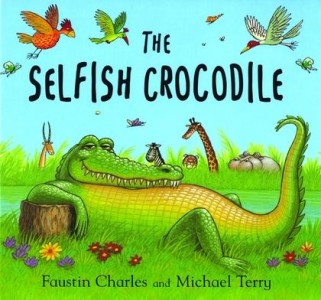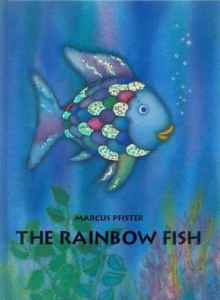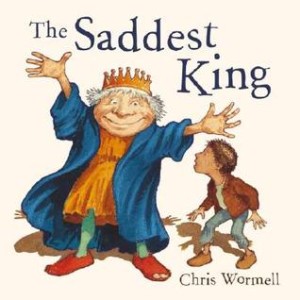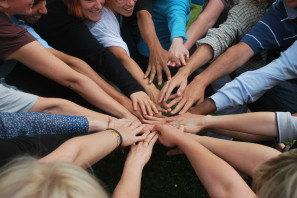Context
In Year 1 (age 5 – 6) we decided to trial an alternative measure for social justice, measuring children’s moral imagination by asking what if? questions to test their ability to imagine consequences. We felt it would be more useful at the start of the school year and could be used to inform curriculum planning and class charters. Questions included
- What if there were no class/school charter/rules?
- What if there were no rights?
- What if everyone was the same?
- What if only boys/girls were allowed to…….
We then used a story as a good starting point for the question. Marcus Pfister’s The Rainbow Fish or Faustin Charles’ The Selfish Crocodile could be used for sharing. Chris Wormell’s The Saddest King could be used to discss rules. Julia Donaldson’s The Smartest Giant in Town could be used for rights. An Elmer story could be used for thinking about not everyone being the same.

- The Selfish Crocodile by Faustin Charles and Michael Terry, picture via Bloomsbury Publishing
Pupils first discussed the concept of what if? questions and as a class thought of some silly examples. We discussed how this type of question makes us think but will not necessarily happen.
The children were then asked What if your teacher banned sharing from tomorrow?
They were given a few minutes thinking time before going off to their tables and writing down their ideas independently, using the sentence starter, If our teacher banned sharing… to help trigger ideas.
Results:
All pupils were aware of the negative consequences that would occur if sharing was banned.
- Some pupils talked about the change of behaviour that might happen e.g. children being naughty, toys getting broken and arguing.
- Some pupils said it would be unfair and that not everyone would get a turn or be able to learn.
- Some pupils talked about how others might feel, either being sad or not having any friends.
- One pupil said that we wouldn’t be able to learn.
Next steps:
- All pupils work together to create class charters.
- Develop pupil reasoning skills.
- Continuing to work regularly on a small, local level, means we can later take it to a more global level as appropriate.
It was then trialled with 4 and 5 year old pupils. They were told that the headteacher had seen some children squabbling over things so had decided to ban sharing. So from the next day nobody at school would be allowed to share. What do you think will happen?
Any additional questions/responses made by the teacher are shown in bold.
| Gender | Age | Response |
| Female | 4 | You couldn’t play with anything they wanted to. You need to share because if someone put a toy down when they finished everyone would fight over it. |
| Female | 5 | No-one will get to play, they would have to look at a story – oh there won’t be enough. It would be sad. |
| Female | 5 | They would fight and it would be noisy. I don’t want to be in the class. |
| Female | 5 | They would be said because they wouldn’t be able to play with the toys. They would be crying. |
| Female | 5 | They would fight and every single person would be on the red cloud. |
| Female | 4 | Sad, because I like it and I want to play with it. Let people do it “Do what?” Take turns, it is important. |
| Female | 4 | It’s not good. Teachers will tell them off for not sharing. Get a timer to make it fair “But wouldn’t that be sharing?” I don’t like it. |
| Female | 5 | No, people will shout. I will not be happy. |
| Female | 5 | Children not happy because it’s not nice. We won’t be able to play with things. |
| Female | 5 | We would all be disappointed because we wouldn’t get to share and we would not have time to do what we want to do. |
| Male | 5 | We can’t play because we need to play carefully with people. The toys will break because they will all fight. |
| Male | 5 | We would be really sad because not everyone will have a go with the toys. |
| Male | 4 | People would go on the orange and red clouds because they would be naughty. |
| Male | 5 | We won’t get any toys because they are not sharing. You would have to play without toys because there would not be enough. |
| Male | 5 | They would be fussing around and pushing and shoving because they would want a turn and wouldn’t wait to play. |
| Male | 5 | Everyone will cry because they want to play with toys and they can’t share. |
| Male | 5 | They would be sad because they would want toys but wouldn’t have a chance to play because there is no sharing. |
| Male | 5 | People would fight because they want the same things. We would have to get a time and ourselves. “But wouldn’t that be sharing?” Oh we can’t even use a timer. |
| Male | 5 | Not being kind, they would be mean. It won’t be a nice class. |
| Male | 4 | It wouldn’t be fair because if someone had all the things that somebody wanted, because some people would have nothing to play with. |
| Male | 4 | You would have to get a timer and swap it over. “But wouldn’t that be sharing?” I don’t know. It would be not nice. |
| Male | 5 | Everyone will feel sad because when they want a car and someone has it they wouldn’t get it. |
| Male | 5 | Nobody would be able to get the things they wanted. They would be sad |
| Male | 4 | Everybody would get sad because they couldn’t play nicely and they play nicely now. |
| Male | 5 | They will snatch and throw things because they had it first and they will not calm down. It will be a bad class. |
All pupils regardless of age or gender thought it would affect them and would not be a positive thing. Many said that they would be sad. Several referred to a strategy already used in class where a timer is used to ensure that toys being used by someone else are shared within a session. Other children referred to the fact that children would be on orange and red clouds – part of our behaviour management where children’s names are moved when they do not make the best choices.
We have done a lot of work on sharing and equality this year so this would most certainly have a bearing on the views of the children.
A few months later in September, at the start of the new school year, we trialled the What if? activity again with a new Year 1 class as a starter to creating a class charter. The children were asked What if…your teacher banned sharing from tomorrow?
Instantly it was apparent that these children were not as developed in their understanding of social justice and equity because I needed to explain and ask the question again. When this activity was done with the previous Year 1 class towards the end of term they were confident in their views and knew why it was not fair.
Comments from the class
| Girl | 5 | You won’t share the assemblies. |
| Girl | 5 | It would be a really rough school, everything would get torn. |
| Girl | 5 | We wouldn’t have toys to play with. |
| Boy | 5 | It wouldn’t be a nice school anymore because nobody shares. |
| Boy | 5 | They may take the toys home for themselves. |
| Boy | 5 | They can’t run and will have no energy. |
| Girl | 5 | People won’t be nice to children. |
| Boy | 5 | Everybody would be a little bit sad. |
| Boy | 5 | It would just be their own. |
| Girl | 5 | You would get hurt and wouldn’t be able to play. |
| Boy | 5 | You would have no friends. |
The majority did not respond and those who did were unable to extend their ideas or provide reasons without prompting. This could be due to maturity, lack of knowledge on the impact of sharing, lack of confidence in own ideas, lack of understanding of social justice.
Follow up work based on sharing and social justice will take place over the year and a re-audit of this task will be done later in the year.




